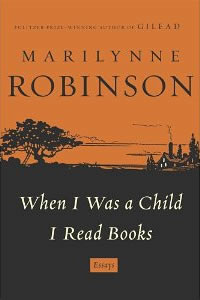Book Notes
 Marilynne Robinson, When I Was a Child I Read Books: Essays (New York: Farrar, Straus and Giroux, 2012), 206pp.
Marilynne Robinson, When I Was a Child I Read Books: Essays (New York: Farrar, Straus and Giroux, 2012), 206pp.
I suspect that most readers know Marilynne Robinson (b. 1943) from her three novels written across thirty years — Housekeeping (1981), then twenty-three years later Gilead (2004), which won the Pulitzer Prize, and Home (2008). Many readers, though, might not know that she's also written three works of non-fiction, in which she's established a reputation as a publicly Christian public intellectual. She's lectured at numerous universities, including Oxford and Yale, and written pieces for the Paris Review, Harper's, and the New York Times Book Review. Since 1991 she's taught at the Iowa Writers' Workshop. This is her fourth work of non-fiction, a collection of ten essays, six of which appeared in different forms in earlier publications.
This collection of essays continues themes that Robinson has addressed elsewhere. They're centered around her admittedly polemical critique of the spirit of the times and its many modern myths. She's especially concerned that much received "wisdom" gets a free pass as a "criticism beyond criticism." Many treatments of human nature, for example, ignore the felt experiences of life that no explanation can capture, but which have been the subject of great literature for millennia, like tragedy and beauty, guilt and forgiveness, irony and truth. We have a genuine intuition of these things, about the "tantalizing not-yet-knowable and the haunting never-to-be-known," and we should pay attention to that.
Robinson has read widely in science, and as in many of her writings she pushes back against the so-called new atheists like Dawkins and Hitchens. She's on record as describing her commitment to Calvinism, and in several essays tries to establish the liberality and open-handedness for civil society found in Calvin and important followers like Jonathan Edwards. Contrary to common caricatures, she finds Calvin to be a source for all that's best about America liberal generosity to the vulnerable. Her most personal essay here is the title piece, "When I Was a Child." Other intellectual fads that she finds tendentious include Darwin and Freud, the idea that Mosaic monotheism is punitive and the cause of modern evils (she finds it "profoundly humane"), and an ideology of "market economics" that threatens to "devour what we hold dear" — culture, education, the environment, and science. You might need a dictionary for some of this (alembic, annealing, mythopoesis, salubrious, etc.), but by now many readers have affirmed that anything written by Marilynne Robinson is worth the effort to read.


